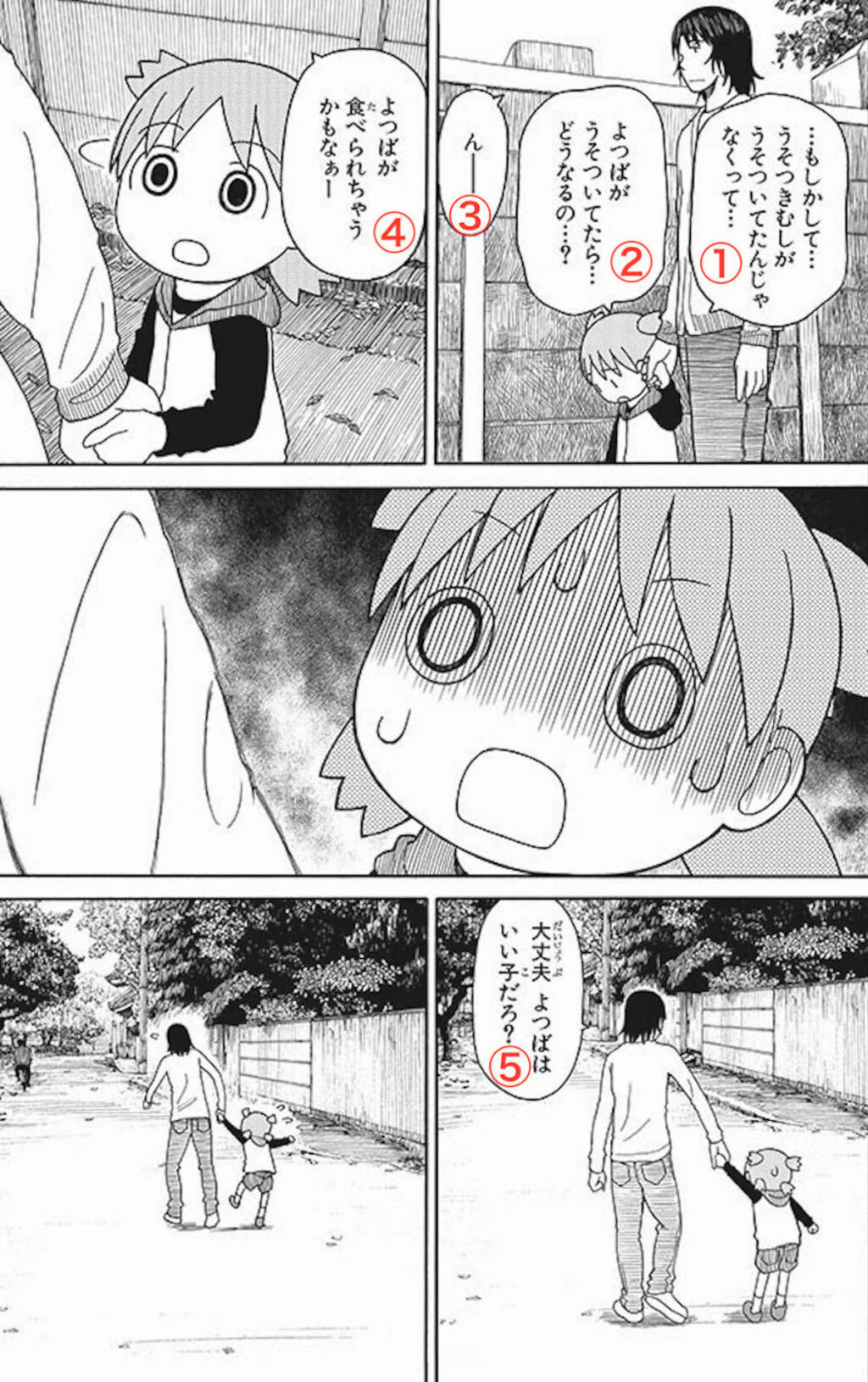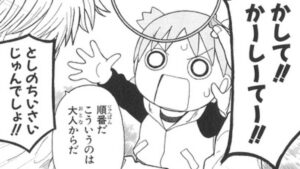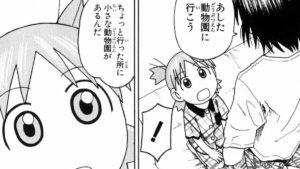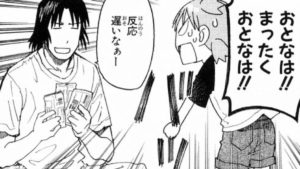Let’s learn Japanese with our analysis of manga. We will analyse a manga snippet from Yotsubato! (よつばと!) Volume 10.
CONTENTS
Manga Snippet
Sentences
Mouseover (tap on a smartphone/tablet) to reveal the censored romaji and English translation.
-
…もしかして…うそつきむしがうそついてたんじゃなくって…
…moshikashite… usotsukimushi ga uso tsuiteta njanakutte…
…By any chance… if it wasn’t the lying bug that is telling lies and… -
よつばがうそついてたら…どうなるの…?
yotsuba ga uso tsuitetara… dōnaru no…?
If Yotsuba (I) was the one telling lies… what would happen? -
んー
nnn
Hmm -
よつばが食べられちゃうかもなぁー
yotsuba ga taberare chau kamo nā
Yotsuba (you) might get eaten -
大丈夫 よつばはいい子だろ?
daijōbu yotsuba wa ii ko daro?
It’s okay. You are a good girl, right?
Analysis of Manga
-
「もしかして…うそつきむしがうそついてたんじゃなくって」
-
「よつばがうそついてたら…どうなるの…?」
- よつば (noun) – name of the main character meaning four (よつ) leaves (ば)
- が (particle) – subject marker
- うそついてたら (verb conditional-form) – if one was telling lies EXAMPLES
- どうなる – what will happen
- の (particle) – indicates question
-
「んー」
- んー (interjection) – used when pausing to think before speaking
-
「よつばが食べられちゃうかもなぁー」
- よつば (noun) – name of the main character meaning four (よつ) leaves (ば)
- が (particle) – subject marker
- 食べられ (verb passive-form) – get eaten
- ちゃう – (contracted form of てしまう) used to make the action sound unfavourable/unintentional EXAMPLES
- かも (particles) – might EXAMPLES
- な (particle) – used to reduce the assertiveness/insistence
-
「大丈夫 よつばはいい子だろ?」
- 大丈夫 (adjective) – all right, okay
- よつば – name of the main character meaning four (よつ) leaves (ば)
- は (particle) – topic marker
- いい (adjective) – good
- 子 (noun) – child, kid
- だろ – right?
Examples
もしかして (by any chance, possibly)
どうして口を聞いてくれないの?もしかして怒ってる?
dōshite kuchi o kiite kurenai no? moshikashite okotteru?
Why aren’t you talking to me? Are you mad at me, by any chance?
山田さん、遅いなぁ。もしかして、迷ってるのかな?
yamada-san, osoi nā. moshikashite, mayotteru no kana?
Mr. Yamada is late. He might possibly be lost, I wonder?
もしかして、日本人ですか?
moshikashite, nihonjin desu ka?
Are you Japanese, by any chance?
We usually use もしかして in question sentences and もしかしたら in declarative sentences.
あの店員は、もしかしたら日本人かもしれない。
ano ten’in wa, moshikashitara nihonjin kamoshirenai.
That staff might possibly be Japanese.
〜んじゃなくって (it is not that…)
行きたくないんじゃなくって、行けないんだよ。
ikitakunai njanakutte, ikenai nda yo.
It’s not that I don’t want to go, I cannot go.
憎いから怒ってるんじゃなくって、かわいいから怒ってるの。
nikui kara okotteru njanakutte, kawaii kara okotteru no.
I am upset not because I hate you, I am upset because I love you.
隠していたんじゃなくって、言うきっかけがなかっただけなんだ。
kakushiteita njanakutte, iu kikkake ga nakatta dake nanda.
It’s not that I was hiding it, it was just I didn’t have a chance to tell you.
たら (if one does)
私が宇宙人だったらどうする?
watashi ga uchūjin dattara dō suru?
If I was an alien, what would you do?
宝くじに当たったら、家が欲しい。
takarakuji ni atattara, ie ga hoshii.
If I won a lottery, I want a house.
とりあえず一つ買って、おいしかったら、次は二つ買おう。
toriaezu hitotsu katte, oishikattara, tsugi wa futatsu kaō.
I’m going to buy one for now, and if it tastes good, I’ll buy two next time.
ちゃう (used to make the action sound unfavourable/unintentional)
授業中につい寝ちゃった。
jugyōchū ni tsui nechatta.
I unintentionally fell asleep during the class.
週末はいつも寝坊しちゃう。
shūmatsu wa itsumo nebō shichau.
I always unintentionally sleep in on weekends.
友達とつまらないことで喧嘩しちゃった。
tomodachi to tsumaranai koto de kenka shichatta.
I argued with my friend over a trivial matter.
かも (might)
走れば電車に間に合うかも。
hashireba densha ni maniau kamo.
If we run, we might make the train.
体調が悪いから、明日学校に行けないかも。
taichō ga warui kara, ashita gakkō ni ikenai kamo.
I feel sick so I might not be able to go to school tomorrow.
傘を持っていったほうがいいよ。あとで雨が降るかも。
kasa o motteitta hō ga ii yo. ato de ame ga furu kamo.
You’d better take an umbrella with you. It might rain later.
かも is the shorten word of かもしれない used in casual speech. In formal speech, you say かもしれません or かもしれないです (less formal).
Support Easy Peasy Japanesey
If you enjoy our content, please consider supporting Easy Peasy Japanesey. Your support will help keep us going. Thank you for your support!



